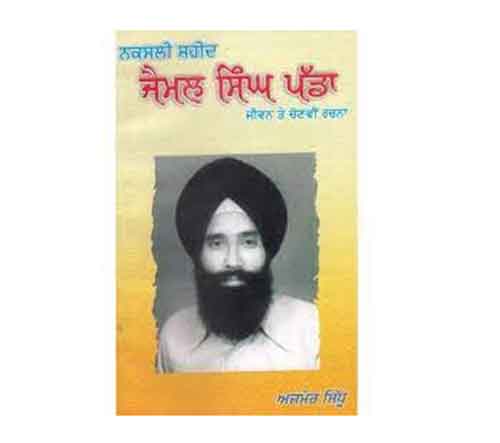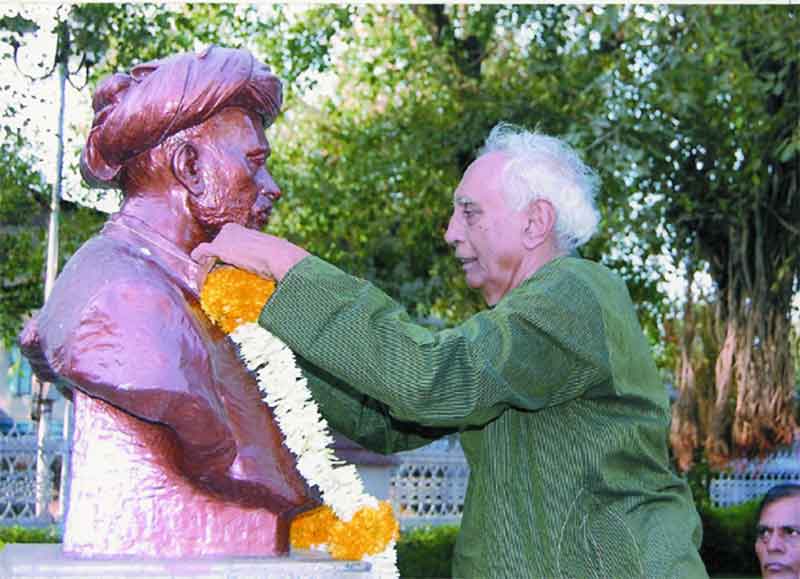
On March 17th we commemorated the 35th martyrdom anniversary of Jaimal Singh Padda, who laid his life down in combating Sikh religious fundamentalism, and fell to bullets of Khalistani terrorists, in 1988.Jaimal Singh Padda was a poet of revolutionary thought who was born in Lakhan Ke Padda village of Kapurthala. He was killed by terrorists on 17 March 1988. A full six days before Paash .Padda championed communal harmony till his last breadth. His name will be inscribed in golden letters and will carve a permanent niche amongst the Communist martyrs.
Padda was filmed reciting his poem Una Mitterandi Yaad Pyari, before his death, by Anand Patwardhan in his documentary Una Mitteranadi Yadd Pyar.We must commend Padda for unflinchingly never soft pedalling with Sikh separatist forces or state terrorism. In Punjabi Ajmer Sidhu has written a biography of this revolutionary martyr.
Jaimal Singh Padda already had poetry in his family. His father Santokh Singh Mastana was a famous poet of Doab. Padda dipped ink as a weapon for liberation. At the time of his murder, his son Jasbir Singh Padda was living in Norway. His letter to his mother has also been included by Darshan Khatkar in the book ‘Peer Sool Te Vi Nachde Rahe’. Ajmer Sidhu has also edited a book titled Life and Works of Naxalite Shaheed Jaimal Padda. Jaimal Singh Padda’s writings are now with us like Rah Disera Amanat. — Gurbhajan Gill
Early Life
Born in 1943, Padda’s father Santokh Singh Mastana was a Sikh farmer and an activist associated with the Akali Dal – a regional party of Punjab that claimed to represent the interest of Sikh peasantry. As Padda grew up, he evolved into a Marxist revolutionary and consistently negated Sikh Religious or Khalistani fundamentalism. Padda in the very thick of the skin countered Sikh fundamentalist philosophy with Marxist principles of egalitarianism and to the last straw invigorated followers to stand up against Khalistani and state repression. Padda excelled in sports and exhibited great talent in reciting poems when he was in the high school.
Social Work and Politics
Under the influence of a veteran Communist in his native village Lakhan Ke Padda, Padda gained his baptism into the Communist movement. He embarked in activities, such as raising awareness against social ills and superstition through plays and cleaning up village streets and drains. He also strived to educate people about current political affairs and various struggles using basic mechanisms such as blackboard in the village.
Padda had to strive hard to earn his livelihood through farming as he had a very small landholding and tried his hand in driving taxi outside Punjab. He also taught the seniors as part of the state run program of educating the illiterates.
He got married to Amarjit Kaur in 1964 and the couple had three children. Inspite of facing domesticity and economic hardships Padda remained undeterred in pursuing his political conviction. In 1967, he integrated with the revolutionary communist movement that got birth with the uprising at village Naxalbari in West Bengal following police repression of tillers fighting to liberate themselves from the shackles of the landowners.
In the mid 1970’s Padda joined the ranks of the Communist Party of India (Marxist-Leninist) Satyanarayan Singh-Chandra Pulla Reddy group. As a mass leader of the Kirti Kisan Union he was instrumental in leading many agitations for farmer’s remunerative prices and had to suffer police torture and arrests. He raised voice for the revolutionary communists who were killed by the Punjab police in staged shootouts. He was also in the forefront of the agitation against Emergency that was imposed by the then Prime Minister Late Indira Gandhi in 1975. In the very roots Padda exposed how the Green Revolution morally endorsed capitalism and alienated the bulk of the Punjab peasantry.Amarjit Kaur stood behind him with the tenacity of a rock throughout this period.
Padda was an outstanding singer. His voice and rebellious poetry became a mascot in mobilizing crowds for the public meetings of CPI (ML). This had inspired prominent documentary filmmaker Anand Patwardhan to make a film on the communists who were fighting against reaction and the state in Punjab. The film is named after the lines from Padda’s famous song “Una Mitran Dee Yaad Pyari” (In sweet memories of those comrades).It is unforgettable the manner villagers of Punjab covered to meetings addressed by Jaimal Singh Padda.
Role in Punjab turmoil
In 1980s, Punjab went through its worst political crisis, with the advent of the Khalistani movement. The Akali Dal was asking for political autonomy of the state and concessions for the Sikh minority who merely make two percent of the Indian population while Indira Gandhi bent the issue in order to polarize Hindu majority against the Sikhs, even creating a figure like Jarnail Singh Bhindranwale,to split the Sikh vote. This paved the way for a parallel movement of Sikh extremists who believed in an armed resistance, and, death squads began targeting innocent Hindus and political critics, including moderate Sikh politicians.
When, the Golden Temple Complex, the holiest shrine of the Sikhs in Amritsar turned into a fierce battle ground.,Padda raised his bold voice equally against both the Sikh and the Hindu fundamentalists during this time. His slogan was “Naa Hindu Raaj, Naa Khalistan, Raaj Karega Mazdoor Kisaan.” (Neither Hindu state, nor Khalistan, we want the working class to rule)
Engulfing many an area in Jalandhar ,Kapurthala and Amritsar Padda staged public forums to challenge the Khalistani fascist dictates and their continued harassment by the police in the name of war on terror, he kept receiving threats from Khalistanis who also saw communists as their enemies. Padda who wore turban and sported flowing beard was continuously targeted by the Khalistani terrorists and also detained on couple of occasions on suspicion of being a Sikh militant by the police. The state did not really discriminate between the Khalistanis or the communist revolutionaries.
In the darkest days of Khalistani and state terrorism Padda displayed the relentless spirit of a soldier, scaling courage in the zones of all the famous Communist revolutions or rebellions. In the most intense hotbeds of state and Khalistani terrorism, with daunting courage Padda organised rallies democratic forces to resist the twin enemies. It is hard to describe how his voice rendered service to the battle, resurrecting spirit of secular combat, amongst the people. On many an occasion he ressurected villagers spirits from the depths of despair. Countless times he saved hindu families from falling victims to Khalistani fascists and rescued Sikh youth from clutches of torture. The people literally felt his voice spoke their hearts.Padda led self defence armed squads of villagers of Hindus and Sikhs, in undertaking retaliatory actions in self-defence against Khalistani brigades. Padda’s voice had powerful spiritual overtones, creating the sensation of a song being sung in your heart. Padda in the very thick of the skin countered Sikh fundamentalist philosophy with Marxist principles of egalitarianism and to the last straw invigorated followers to stand up against Khalistani and state repression. Padda often used examples from the Sikh history to connect with the masses who understood religion more than the dynamics of left wing politics. His slogan was “Naa Hindu Raaj, Naa Khalistan, Raaj Karega Mazdoor Kisaan” (Neither Hindu state, nor Khalistan, we want the working class to rule).
On one occasion, Hindus from his village intervened to get him released. He had two houses in the village. One was located in the Hindu dominated colony. For his safety he mostly stayed there during the night. On March 17, 1988 he was killed right outside this house by the shooters belonging to Khalistan Commando Force (KCF) that later claimed responsibility for his murder, the KCF leader Labh Singh was responsible for Padda’s murder.
Memories
I have vivid memories of the commemoration programmes staged in Delhi and Bombay in 1988, in Padda’s memory and his addressing a programme of ‘Ekta’ forum for Communal harmony in Mumbai in 1986.Padda in most simple language narrated how the Congress and Akali Dal were virtually repeating the history of partition, by playing rule and divide politics and how the Khalistani separatist movement did not have the slightest support o the broad masses. Padda illustrated the innate secular consciousness amongst the Punjab people and the secular legacy of Punjab. His compassion or feeling of love, always linger in my memory. Mumbai activists reflected his gentle tone and the manner he exuded love.
The Communist Party of India (Marxist-Leninist) New Democracy held a conference at Kukrawala last April, near Amritsar, to pay tributes to those who laid down their lives during the naxalite movement in Punjab.The party remembered 13 martyrs, including Baldev Singh Mann, Sarabjit Singh Bhittewad, Jaimal Singh Padda, Gian Singh Sangha, Amreek Singh Paniar, Balwant Singh Lala Afgana, Balwinder Singh Chinna, Kartar Singh Chinna and Kaka Kabal Singh Lali.
To this day Jaimal Singh Padda’s spark still shimmers in Punjab, like an inextinguishable flame. In memorial meetings of martyrs, Padda’s sacrifice is always illuminated. We need Padda’s to be reborn today when Sikh Fundamentalism is again perpetuating again in Punjab and the peasantry is burned by debts on a scale unparalleled. Padda’s kind must be emulated to galvanise people to confront the tyranny of Hindu fascist fundamentalism, today and to steer the mass movements of farmers and labourers, who are alienated at an unparalleled scale. His voice today reverberates in the secular resistance of the farmers in Punjab and of the dalit agricultural labourers.
Harsh Thakor is a freelance journalist who has frequently toured Punjab and covered mass movements
















































